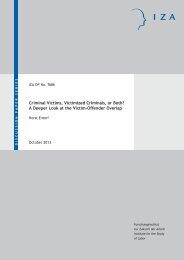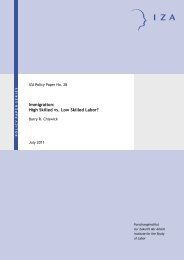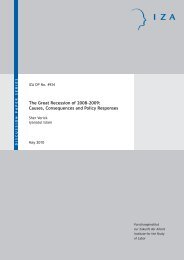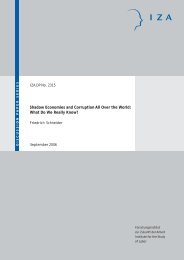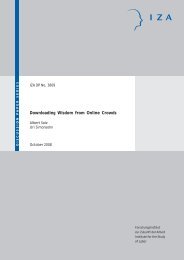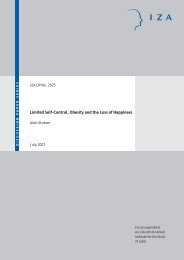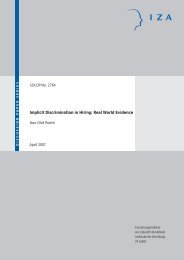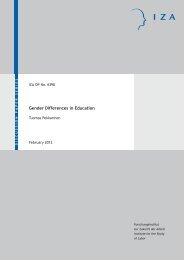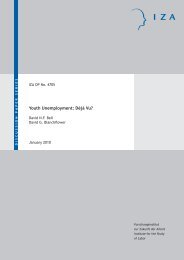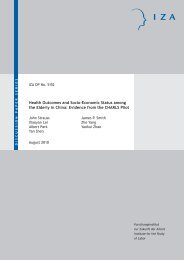Extra Status and Extra Stress: Are Promotions Good for Us? - Iza
Extra Status and Extra Stress: Are Promotions Good for Us? - Iza
Extra Status and Extra Stress: Are Promotions Good for Us? - Iza
Create successful ePaper yourself
Turn your PDF publications into a flip-book with our unique Google optimized e-Paper software.
control <strong>and</strong> income) dominates the extra stress (increased stress <strong>and</strong> work hours), or vice-versa.<br />
The following section attempts to shed light on this issue.<br />
5.3. Effects of a Promotion on Health <strong>and</strong> Happiness<br />
Table 4 presents the estimated wellbeing effects from receiving a promotion. Given the large<br />
impacts on status <strong>and</strong> stress observed in Table 3, in the short- <strong>and</strong> medium-term, the most<br />
striking aspect of the results is the lack of any large significant effects. General health, vitality<br />
<strong>and</strong> life satisfaction are unaffected in all time periods, with the insignificant effects generally less<br />
than 5% of a st<strong>and</strong>ard deviation. The only strongly significant effect is <strong>for</strong> mental health, which<br />
is little affected in the first two years, but becomes more negative thereafter: 24-30 months after<br />
a promotion the effect equals -0.078 <strong>and</strong> is significant at the 1% level (p-value equals 0.004); 30-<br />
36 months <strong>and</strong> 3+ years after a promotion the effects equal -0.057 <strong>and</strong> -0.050, <strong>and</strong> are significant<br />
at the 10% level; <strong>and</strong> the F-test on the medium-term effects has a p-value equalling 0.013.<br />
The generally insignificant effects, especially those in the short-term, indicate that large<br />
changes in job attributes do not necessarily lead to discernible changes in life satisfaction or in<br />
perceived health. A possible explanation is that the positive effects on health <strong>and</strong> happiness due<br />
to increased job control, security, pay fairness, income <strong>and</strong> overall satisfaction are negated by the<br />
negative health effects of increased stress <strong>and</strong> longer hours worked. Another possible<br />
explanation is that moderate changes in job satisfaction are insufficient to affect worker health<br />
<strong>and</strong> happiness levels. As Boyce <strong>and</strong> Oswald (2012) conjecture, it may take “a major change in<br />
[job] status to make a difference to physical <strong>and</strong> mental health.” This conclusion runs contrary to<br />
many findings in the job satisfaction literature, which typically show a strongly positive<br />
relationship between job satisfaction <strong>and</strong> wellbeing (e.g. see Fischer <strong>and</strong> Sousa-Poza’s (2008)<br />
panel-data analysis). However, we are not aware of any study in this literature that convincingly<br />
controls <strong>for</strong> the effects of health <strong>and</strong> happiness (due to non-work reasons) on self-reported job<br />
satisfaction. To control <strong>for</strong> such reverse causality an instrumental variables approach is needed,<br />
though it is hard to imagine an exogenous shock that influences health <strong>and</strong> happiness purely<br />
through its effect on job satisfaction.<br />
Our somewhat surprising finding of no life satisfaction effects contrasts with findings in<br />
Di Tella et al. (2010) using the German Socioeconomic Panel. They report that there is little<br />
adaptation to job status changes after several years, where status changes are measured using<br />
15



